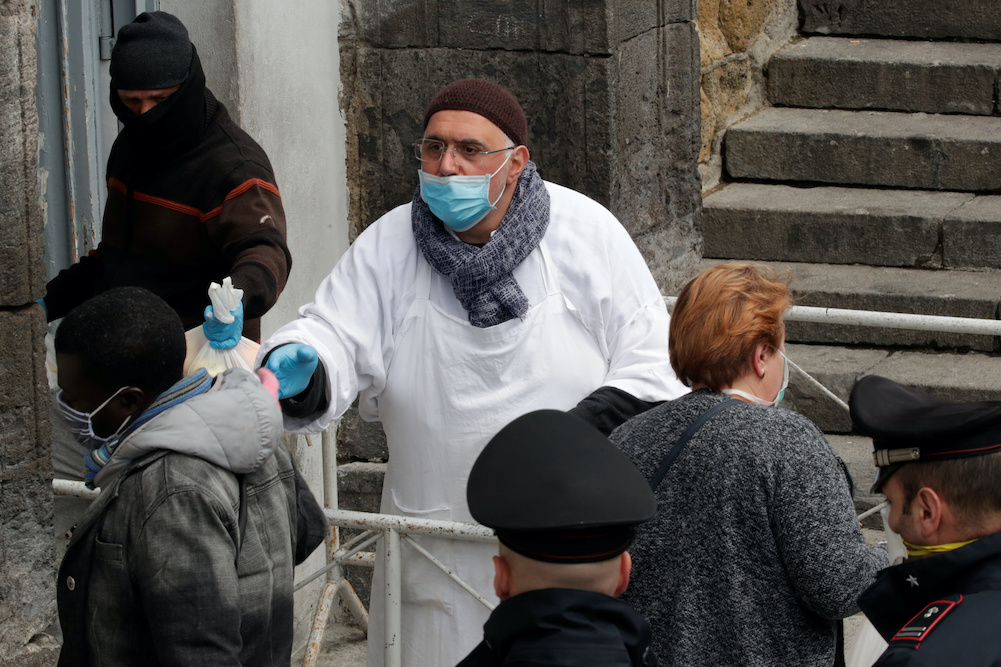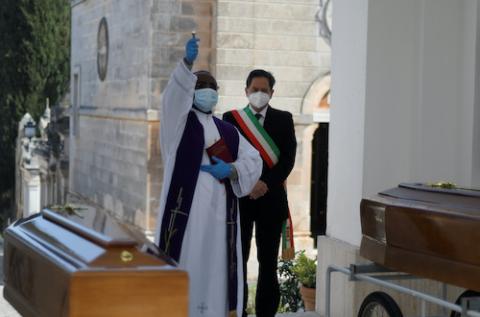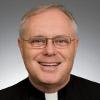
A priest wearing a protective mask hands out bags of food to the needy in Naples, Italy, March 27. (CNS/Reuters/Ciro De Luca)
What can the church say about the COVID-19 pandemic? We can offer a lot of courage and the perspective of experience.
Courage, this disease is not a punishment from God. It is not the end of the world. It is not a curse. Pandemics have happened before. They will happen again.
Pope Francis has been warning us that our abuse of the natural world, our common home, would have disastrous consequences. He has been pleading with capitalism and commercial interests to put people above profit. Now we see his warnings had merit.
Experience, these pandemics are not a surprise. They happen regularly throughout history like hurricanes and floods. But they are more deadly today because there are more people and we live in a globalized world that allows people to fly from Beijing to Washington in 19 hours.
Pandemics happen with regularity. In my lifetime (since 1950), there have been at least eight global pandemics which have killed millions of people. These include Asian Flu, 1957-58; Hong Kong Flu, 1968-70; AIDS, 1981 to present; SARS, 2003; Swine Flu, 2009; MERS, 2015; Ebola, 2014-16, and now COVID-19. The outbreak of the Spanish Flu in 1918 took the lives of about 50 million people, including about 675,000 Americans, in a few short months.
In 1922, the International Health Office created the League of Nations Health Committee and Health Section. In 1948, that committee was renamed the World Health Organization. Its goal is to promote good health and to combat the spread of disease. It works mostly through the "soft power" of information and persuasion. It also coordinates eradication efforts for diseases like smallpox and polio. The WHO does research to develop vaccines, as it did for Ebola and is doing now for COVID-19. It is the only worldwide health planning body and needs our support.
Since our experience tells us that pandemics will recur, we should prepare for them now.
Advertisement
I have been involved in two pandemic planning committees in rural Maryland, one for our local hospital and the other for our county health department.
Our hospital pandemic planning committee was part of the board of directors that I served on at the time. It established procedures for handling a mass outbreak of life-threatening communicable disease. For instance, we became concerned that hospital rooms containing more than one patient could spread disease from patient to patient. We set a long-term goal to renovating the hospital to make all patient rooms private. After 10 years, that goal is now accomplished.
We established a rigorous hand washing protocol, making it mandatory for everyone entering and leaving a patient room or touching a patient to wash their hands.
We held bio-containment drills. We built an isolation suite in the emergency room. We talked about how to establish a triage center outside the hospital, to keep from bringing disease into the emergency department.
We established procedures for wearing protective equipment like gowns, gloves and masks, and we required hospital chaplains and other non-medical visitors to follow the same protocols as medical personnel.
With the county health department committee, my role was to bring a religious perspective to pandemic response. For example, we discussed how would we handle mass burials if we were getting as many as 50 deaths per day. Could we do immediate burials and postpone funerals to another date? (Yes.) Would Catholics object to cremation? (No.) How would we cremate as many as 50 people per day if we had only one crematorium? (Bring in refrigerator trucks to handle the back-up.) Would we be able to administer the "last rites" remotely to infectious patients? (No, but we could pray with the dying through a glass barrier or pray over the phone if necessary.) We could be present in some way to the dying.

A priest blesses the coffins of two victims of the coronavirus disease during a burial ceremony in Cisternino, Italy, March 30. (CNS/Reuters/Alessandro Garofalo)
My point is that we did pandemic planning, just like we had active shooter drills and natural disaster planning. We knew it would eventually come, even to rural Maryland. This is the important work of public health agencies like the Centers for Disease Control and Prevention and the National Institute of Allergy and Infectious Diseases. Pandemics are not a surprise.
Pandemics change societies. They also affect the church.
The Catholic Church was profoundly affected by the Black Death (1347-1353), which killed about 75 million people. Priests, monks and nuns were especially hard hit because they ministered to the dying. Afterward there was a shortage of clergy. It might happen again. Already more than 100 priests have died in Italy from COVID-19. The Diocese of Bergamo, Italy, has lost 24 priests. Theologically we became focused on the four last things: death, judgment, heaven and hell. The theory of "limbo" gained new currency.
Like the Black Plague, COVID-19 will probably have some long-term impact on the Catholic Church. I suspect that it will accelerate two seemingly contradictory trends.
First, when the virus passes, many people will make an enthusiastic return to the church. Absence makes the heart grow fonder. Isolation will show how important the living community of the church is to our spiritual life. Empty churches and a deserted St. Peter's Square on Easter morning made us realize that the church is not just clerics, she needs the laity.
Second, another group will fall away from the church permanently. Having been on their own for weeks at a time, they may now feel that they did not miss the church. This may be true especially for young people who were already only tangentially connected to religion prior to the pandemic.
After COVID-19, some parishes will probably close their doors permanently. Dioceses also will struggle financially. There will be huge demands on Catholic Charities, hospitals and social ministries.
Unfortunately, the ideological divisions in the church will probably be exacerbated. Conservative clerics may use the experience of the pandemic as an excuse to do away with things they have never liked, such as Communion in both forms, holding hands at the Our Father and the handshake at the sign of peace. Liberals may realize that lay-led prayer groups and women preaching to small groups during the pandemic were enriching. Why not continue? It could open the door to a less clerical church.
A possible effect will be the rise of the "virtual" church. People will now be accustomed to livestreamed Masses on YouTube and prayer services on Zoom. Evangelicals have been doing this for years. Just ask Joel Osteen. This might mean that the Eucharist will become less central to our lives.
The church has lived through pandemics before. It will survive. But we will be changed.
[Fr. Peter Daly is a retired priest of the Washington Archdiocese and a lawyer. After 31 years of parish service, he now works with Catholic Charities.]
Editor's note: We can send you an email alert every time Fr. Peter Daly's column, Priestly Diary (formerly called Parish Diary), is posted. Go to this page to sign up: Email alert sign-up.







